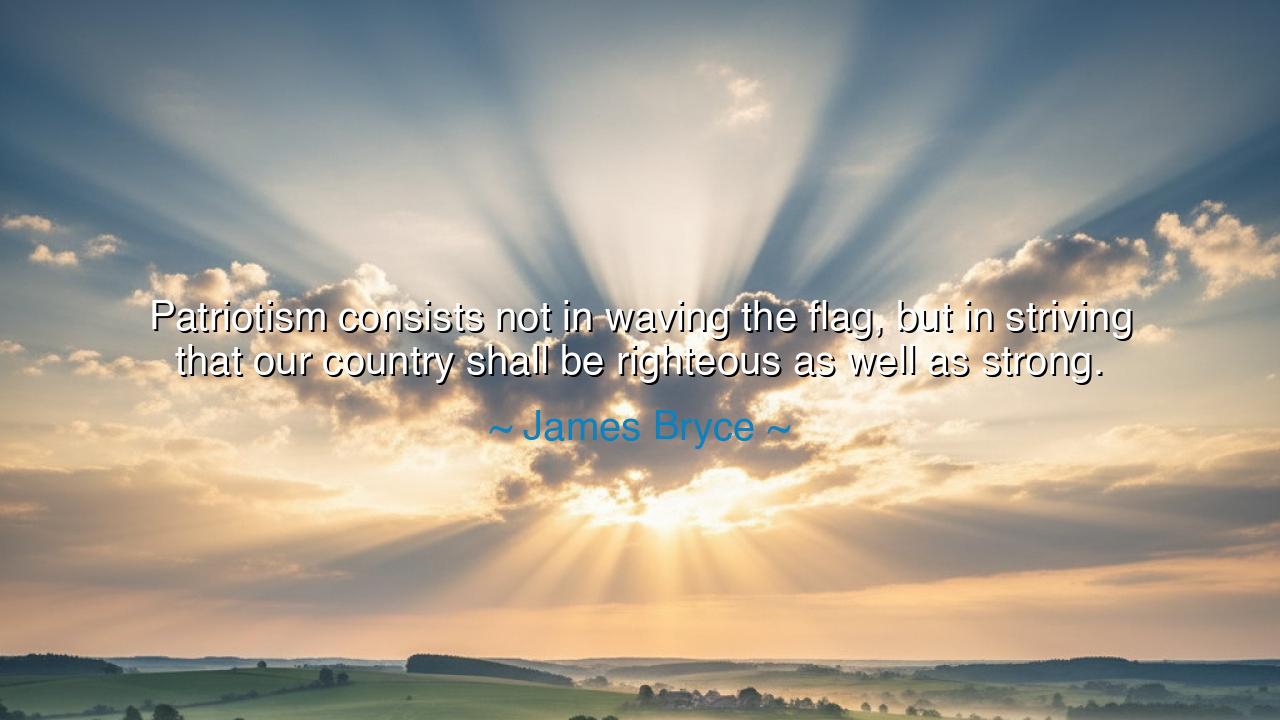
Patriotism consists not in waving the flag, but in striving that
Patriotism consists not in waving the flag, but in striving that our country shall be righteous as well as strong.






The words of James Bryce—“Patriotism consists not in waving the flag, but in striving that our country shall be righteous as well as strong.”—resound like the solemn voice of an elder, reminding us that symbols without substance are empty shadows. A flag may flutter in the wind, its colors bright against the sky, but if the land it represents is unjust, then the waving of cloth is no more than a hollow gesture. True patriotism, Bryce teaches, is not found in noisy displays of pride, but in the quiet, relentless labor of ensuring that one’s nation is both righteous and strong.
At the heart of this truth lies the union of power and justice. Strength without righteousness leads to tyranny, and righteousness without strength crumbles before the storms of history. The patriot, then, is not the one who boasts of his country’s might alone, nor the one who speaks only of virtue without securing it; he is the one who strives to hold both together. This is the higher form of devotion—to labor so that the nation is feared not for its cruelty, but respected for its honor.
Consider the example of Abraham Lincoln during the American Civil War. Many shouted for victory, for the crushing of the Confederacy, for the waving of the flag over the battlefield. Yet Lincoln saw that victory without righteousness would leave the nation hollow. He pressed not only for triumph in war but for the abolition of slavery, so that the Union would not merely survive, but survive purified. In him, we see Bryce’s truth embodied: patriotism as striving for a nation both strong and just.
History also warns us of the opposite. The empires of old—Rome at its height, or the armies of Napoleon—were mighty beyond compare, their flags feared across continents. But their strength was not matched with righteousness, and thus their glory turned to dust. Rome decayed in corruption, Napoleon fell to pride, and the power they once wielded collapsed into ruin. Their flags waved proudly, but they stood not for justice. Thus their patriotism, such as it was, proved shallow and unsustaining.
The ancients themselves spoke of this balance. The Greek philosophers declared that a polis must cultivate both virtue and power, else it would perish. Aristotle taught that the good state is one that rules justly, not merely forcefully. James Bryce, echoing these ancient voices, calls us to remember that the truest measure of a nation is not its banners or its armies, but whether its power is tempered with righteousness, its laws with justice, and its strength with mercy.
The lesson for us is clear: let us not be content with displays of loyalty—flags, slogans, and parades—while ignoring the deeper work of justice. True patriotism demands effort: to root out corruption, to defend the weak, to demand fairness from leaders, to build a country worthy of love. It is not the pride that swells in a moment of spectacle, but the daily striving to make the nation a light rather than a shadow in the world.
In daily life, this means holding leaders accountable, working to heal divisions, standing for truth even when it is unpopular, and laboring for the common good. It means teaching our children that love of country is not about empty gestures, but about working to make their homeland better, fairer, and nobler. This is the way a nation becomes both righteous and strong, and this is the highest form of loyalty.
Thus let Bryce’s words echo as a commandment across the ages: patriotism is not the waving of a flag, but the striving for righteousness. Let us not be deceived by mere appearances, but commit ourselves to the harder path, the path of building a nation that stands not only tall, but stands just. For in the union of justice and strength lies the destiny of every people, and in their absence lies only decline.






AAdministratorAdministrator
Welcome, honored guests. Please leave a comment, we will respond soon